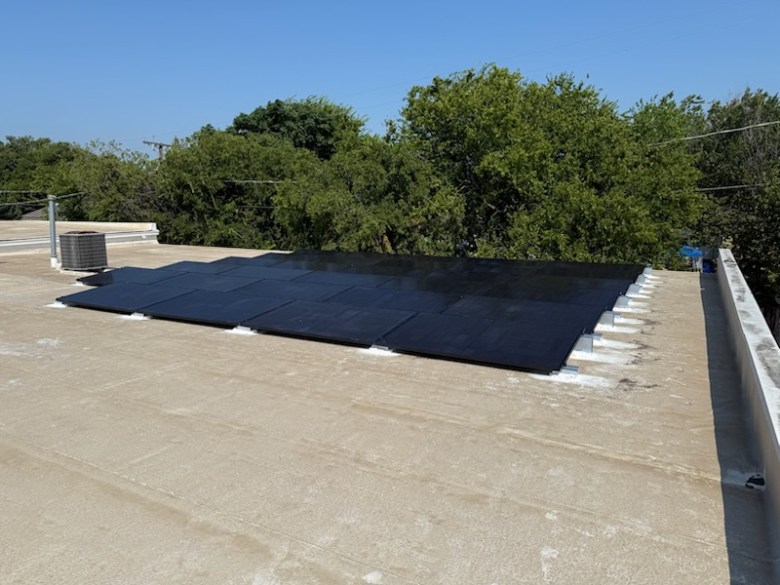The Sinclair Hotel is a downtown Fort Worth landmark because of its architectural legacy. It also is gaining national recognition as a highly energy-efficient building.
For a hotel almost a century old, earning such recognition was complicated, said Sinclair Hotel owner Farukh Aslam. The work was supported by loan-funded projects through the Property Assessed Clean Energy program, or PACE, as it’s known.
The Sinclair Hotel was not designed with today’s technology, of course, making it prone to energy loss and costly utility bills, said Aslam.
After undergoing a renovation supported by the clean energy program in 2019, The Sinclair Hotel is now equipped with a low-voltage electrical system and other upgraded features such as three-pane windows and variable refrigerant flow air conditioning — an HVAC technology that uses several condensers for more efficient cooling and heating.
Together, these renovations help the building tap into less energy and water, promoting sustainable commercial infrastructure and lower costs.
As the clean energy program has helped provide local officials relief from the costs of energy and water demands, the North Central Texas Council of Governments named two administrators in May — Lone Star PACE and Texas PACE Authority — to help local governments learn more about how to conserve resources while supporting economic growth.
The administrators are tasked with partnering with county and city officials to offer incentives to property owners and businesses through energy efficient building improvements.
While Tarrant and Dallas counties are already working with program administrators, a regional partnership with the council of governments supports the agency’s mission in making energy-efficient projects more accessible to smaller local governments.
“The cost of energy and water is only going to go up,” said Charlene Heydinger, Texas PACE Authority president. “This is a way to protect these buildings, the people who own them, the people who are in them, financially.”
Now, the council of governments is working on interlocal agreements to help smaller city and county governments work with projects supported by the clean energy program, such as energy-efficient HVAC systems, solar panels and water conservation technology, said Susan Alvarez, director of the council of government’s environment and development department.
Naming the two administrators will assist the council of governments in that process.
“We’ve got 16 counties, and that’s a lot of ground,” Alvarez said. “With the growth that we’re seeing, the (council of governments) felt like it was a good opportunity.”
Cost-saving, environmental benefits
Passed by state lawmakers in 2013, the Property Assessed Clean Energy program allows local governments to partner with administrators who assist businesses and property owners with building renovations. The program uses property assessments and low-cost, long-term loans to support energy-efficient improvements.
 A control panel in a guest room at The Sinclair Hotel. The hotel’s appliances and technology operate on a low-voltage power system funded through the Property Assessed Clean Energy program. (File photo | Fort Worth Report)
A control panel in a guest room at The Sinclair Hotel. The hotel’s appliances and technology operate on a low-voltage power system funded through the Property Assessed Clean Energy program. (File photo | Fort Worth Report)
Most commercial properties are built to meet the minimum energy and construction standards because of high costs and limited budgets, said Texas PACE Authority chief operating officer Dub Taylor. This tends to lead to higher energy usage and losses, and, in turn, costly utility bills.
Because the clean energy program helps mitigate higher utility expenses as buildings age, the state authority is seeing an increased interest in the program across Texas, Heydinger said.
“We’re seeing it used a lot for new construction,” Taylor said.
But these energy-efficient projects are not only beneficial to commercial property owners. The effects can be seen regionwide.
North Texas is “somewhat” constrained with its existing water and energy supplies due to booming growth in the region, said Alvarez.
“We had 200,000 people move into North Texas last year. That’s a million people every five years,” she said. “The more we can do to reduce our energy needs, the better it is, overall, for economic growth and air quality.”
In addition to conservation efforts, modernizing aging infrastructure also assists North Texas officials with economic growth and business retention.
“It helps job growth,” Alvarez said. “It helps really support regional sustainability goals relative to both energy conservation and water conservation.”
PACE’s impact across North Texas
Since 2017, the Texas PACE Authority has overseen Fort Worth and Tarrant County-based projects.
Like Aslam, Jill Black, owner of the real estate company Witcher Properties, has taken up some of those projects since the clean energy program was established in the county.
Her first clean energy program-financed project in 2023 added solar panels to her property at 3613 W. Vickery Blvd., where local businesses Holocron Toy Store and Muy Frio Margaritas currently reside.
 Solar panels were installed in July 2025 at the property located at 3950 W. Vickery Blvd., where the Welman Project currently sits. (Courtesy photo | Jill Black)
Solar panels were installed in July 2025 at the property located at 3950 W. Vickery Blvd., where the Welman Project currently sits. (Courtesy photo | Jill Black)
Her latest project in July equipped the building occupied by The Welman Project, at 3950 W. Vickery Blvd., with high-efficiency lighting, an upgraded HVAC unit, and solar energy system.
With Black and her tenants already benefiting financially from the energy-efficient projects, her company is in the process of adding solar energy systems to three more of her properties.
“We’ve seen a lot of benefits,” Black said. “We’re very much interested in the effects of our growing population on the environment.”
Moving forward, Heydinger, along with Black and Aslam, hopes to see more commercial property owners look to clean energy program projects to streamline their businesses.
“It’s fun to drive by a building where you know you’ve made a difference,” said Heydinger. “It’s meaningful, whether it’s big or small.”
Nicole Lopez is the environment reporter for the Fort Worth Report. Contact her at nicole.lopez@fortworthreport.org.
At the Fort Worth Report, news decisions are made independently of our board members and financial supporters. Read more about our editorial independence policy here.
Related
Fort Worth Report is certified by the Journalism Trust Initiative for adhering to standards for ethical journalism.
Republish This Story
Republishing is free for noncommercial entities. Commercial entities are prohibited without a licensing agreement. Contact us for details.
